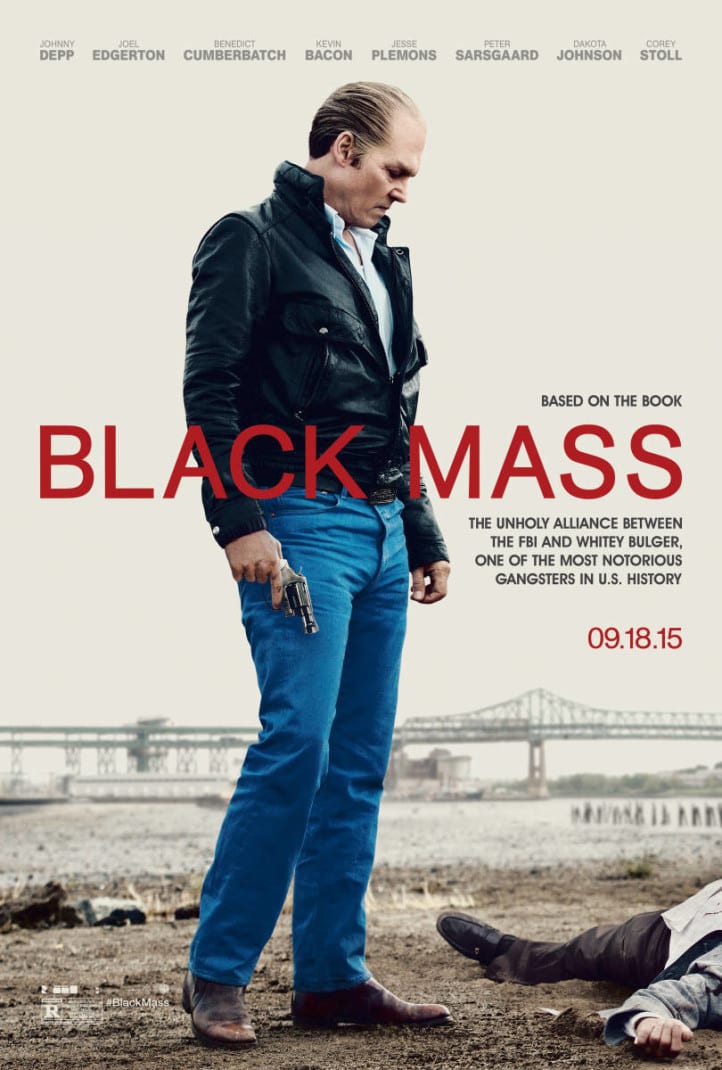BLACK MASS (R)
![]() Filmmaker Scott Cooper follows up his effectively boozy-and dramatic-redemption story, “Crazy Heart” and the meandering “Out of the Furnace” with a too-strange-to-be-true-but-it-is-true crime thriller called “Black Mass.” While this flashy dramatization is beautifully shot and offers up a few decent performances, something is clearly amiss.
Filmmaker Scott Cooper follows up his effectively boozy-and dramatic-redemption story, “Crazy Heart” and the meandering “Out of the Furnace” with a too-strange-to-be-true-but-it-is-true crime thriller called “Black Mass.” While this flashy dramatization is beautifully shot and offers up a few decent performances, something is clearly amiss.
“Black Mass” stars a creepy, off-kilter Johnny Depp as the notorious Whitey Bulger, a criminal who would pose as an informant for the FBI so that he could take the proper steps in running the mafia out of town and ultimately become the dominant crime boss in South Boston.
 “Black Mass” chronicles Bulger’s rise to power during the ’70s and ’80s, focusing on his senator sibling (played by Benedict Cumberbatch), his merry band of criminals (played by the likes of Jesse Plemons, Rory Cochrane, and W. Earl Brown), the mother of his child (played by Dakota Johnson), and his strange bond with fame-hungry FBI agent John Connolly (played by Joel Edgerton).
“Black Mass” chronicles Bulger’s rise to power during the ’70s and ’80s, focusing on his senator sibling (played by Benedict Cumberbatch), his merry band of criminals (played by the likes of Jesse Plemons, Rory Cochrane, and W. Earl Brown), the mother of his child (played by Dakota Johnson), and his strange bond with fame-hungry FBI agent John Connolly (played by Joel Edgerton).
An unrecognizable Depp certainly puts forth his strongest effort in quite a while as a sociopathic hood whose creepy demeanor is only matched by his seemingly contradictory behavior. With his weathered complexion and glassy-eyed, vampire-like appearance, Bulger as presented in “Black Mass,” is the kind of guy who would have you believe that he lives by a certain moral code, but it wouldn’t take much to have this monster of a man turn on you. Bulger was both feared and respected, and he managed to elude authorities by way of a shrewd strategy: making friendly with a “southie-turned-FBI agent” looking to make a mark of his own.
Edgerton is strong as that FBI agent. His John Connolly has an agenda akin to Bulger’s: put an end to the mafia’s reign. But in making a deal with the devil and getting a taste of power, Connolly’s own sense of moral worth is ultimately questioned. As good an actor as Edgerton is, the balance is simply off here, and in the end, Connolly slips by the wayside, which is a shame because Edgerton has proven to be a major talent. Look no further than his expertly crafted thriller “The Gift.” While “Black Mass” uses Depp as the main attraction, this film would have greatly benefited from more Edgerton screen time.
Furthermore, “Black Mass” is populated by a handful of underutilized and underwritten supporting actors. David Harbour, Julianne Nicholson, Kevin Bacon, Adam Scott, Peter Sarsgaard, and Corey Stoll join the aforementioned Depp, Edgerton, Cumberbatch, Johnson, Cochrane, and Brown. Of the supporting cast, Plemons (“Breaking Bad“) is a standout as Kevin Weeks, one of Bulger’s younger, right-hand men. While “Black Mass” suggests early on that Kevin will be vital to the proceedings, his character is also left by wayside as the film comes to a close.
Scott Cooper has clearly set out to make a film akin to “The Departed” and “Goodfellas,” and while the flashy style, fast talking criminals, and moral grey areas are in place, the tiny nuances, character arcs, and operatic sensibility are not. Too often, “Black Mass” feels like imitation, and overall, the film lacks any element of real surprise. Even Bulger’s spontaneous acts of violence feel telegraphed, and they lack the visceral punch they appear to be striving for. A much more effective and terrifying display of unpredictably volatile criminal behavior can be witnessed in Andrew Dominik’s superior “Chopper,” starring a brilliantly terrifying Eric Bana.
“Black Mass” also suffers from a serious lack of authenticity. This film definitely echoes the time period in terms of wardrobe and such, but there’s a kind of grit that seems to be missing, a gritty realism that Ben Affleck brought in spades to his depiction of a seedy South Boston in the underappreciated “Gone Baby Gone.”
There are elements to be admired in “Black Mass,” and it certainly isn’t a bad movie, but as a whole, this film can’t quite capture the chaotic and undeniably intriguing twists and turns that came with the real life story that Scott Cooper is trying to tell here. And in the end, this somewhat disappointing film has got nothing on Joe Berlinger’s insightful and infinitely more compelling documentary, “Whitey: United States of America Vs. James J. Bulger.”




